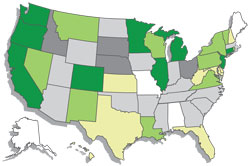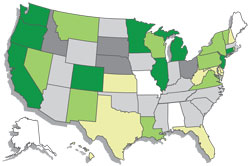January 16, 2019
 To kick off the 2019 state legislative season, NORML is pleased to release our 2019 Gubernatorial Scorecard. This extensive database assigns a letter grade ‘A’ through ‘F’ to states’ governors based upon their comments and voting records specific to matters of marijuana policy.
To kick off the 2019 state legislative season, NORML is pleased to release our 2019 Gubernatorial Scorecard. This extensive database assigns a letter grade ‘A’ through ‘F’ to states’ governors based upon their comments and voting records specific to matters of marijuana policy.
“Following the publication of our 2018 Scorecard, there has been a dramatic shift in opinion among elected officials in favor of marijuana policy reform,” NORML’s Political Director Justin Strekal said. “Never before have we seen so many governors go on record and pledge their support for legalizing the responsible use of cannabis by adults. As a result, we expect there to be unprecedented levels of legislative activity at the state level surrounding the need to regulate the commercial cannabis market in 2019 and in 2020.”
Key Findings
Twenty-seven US governors received a passing grade of ‘C’ or higher (22 Democrats, 5 Republicans)
Of these, nine US governors – all Democrats – received an ‘A’ grade; this marks a significant increase since 2018, when only two governors received ‘A’ grades. They are:
- Gavin Newsom: California
- Jared Polis: Colorado
- Ned Lamont: Connecticut
- JB. Pritzker: Illinois
- Gretchen Whitmer: Michigan
- Tim Walz: Minnesota
- Phil Murphy: New Jersey
- Kate Brown: Oregon
- Jay Inslee: Washington
Ten governors received a ‘B’ grade (9 Democrats, 1 Republican)
Eight governors received a ‘C’ grade (4 Republicans, 4 Democrats)
Fifteen governors – all Republicans – received a ‘D’ grade
Four governors – all Republicans – received a ‘F’ grade
Four governors received no grade because of insufficient data
Of the 24 Republican governors receiving a letter grade, only five (21 percent) received a passing grade of ‘C’ or higher
Of the 22 Democratic governors receiving a letter grade, all of them (100 percent) received a passing grade of ‘C’ or higher
Among the 20 governors taking office for the first time in 2019, six (30 percent) received an ‘A’ grade. All are Democrats.
Seven governors received a raise in their grade since the publication of NORML’s 2018 report. They are:
Jay Inslee – Democrat, Washington: to B+ to A
Andrew Cuomo – Democrat, New York: from C- to B+
Tom Wolf – Democrat, Pennsylvania: from B- to B
Ralph Northam – Democrat, Virginia: from B- to B
David Ige – Democrat, Hawaii: from C to C+
Jim Carney – Democrat, Delaware: from C to C+
Greg Abbott – Republican, Texas: from D- to C-
The Takeaway
There exists now, for the first time, significant political support among US governors for marijuana policy reform. However, this support is more partisan than ever before. While almost half of all Democratic governors are now on record in support of adult use regulation, no Republican governors publicly advocate for this policy. This partisan divide is not similarly reflected among the general public. According to national polling data compiled by Gallup in October 2018, 66 percent of the public – including majorities of self-identified Democrats, Republicans, and Independents – favor legalization.
The results of the 2018 midterm elections also show that advocating for marijuana legalization is a successful campaign issue. Several newly elected governors – such as Ned Lamont of Connecticut, J.B. Pritzker of Illinois, and Tim Walz of Minnesota – actively campaigned on a pledge to legalize the commercial cannabis market, while two additional governors – Gavin Newsom of California and Jared Polis of Colorado – have prominent histories as marijuana law reform advocates. One governor, New York’s Andrew Cuomo, moved decidedly in favor of legalization during his re-election campaign.
This shift in political support among governors bodes well for the prospects of the passage of successful legislative reforms in various states in 2019 and beyond. While to date only one state – Vermont – has moved to legalize adult marijuana use via legislation (as opposed to the passage of voter initiatives), NORML anticipates that as many as four to five additional states (e.g., Connecticut, New Jersey, New York, Illinois, and Rhode Island) may similarly do so in the near future.
Click here to see the full report
Acknowledgments
This information is continually changing and was last updated 4/12/2018. If you have an additional public comment that we do not have a record of or any additional information please email politics@norml.org.
Important and timely publications such as this are only made possible when concerned citizens become involved with NORML. Please consider making a donation today so we may continue to work towards legalization and providing you the tools necessary to be an informed voter.











